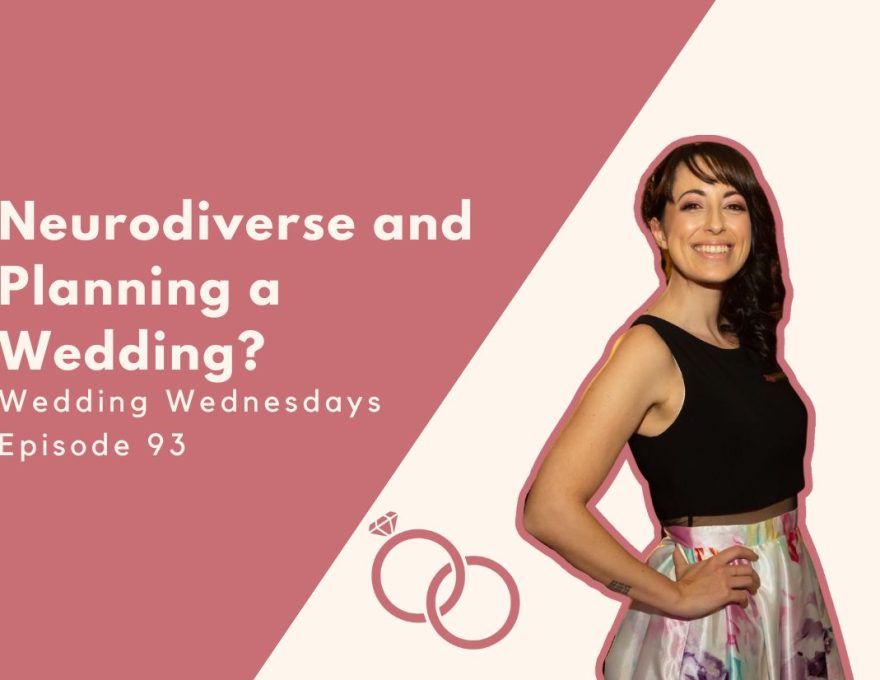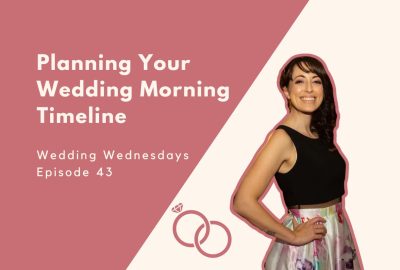If you are neurodivergent, it doesn’t mean you can’t have the wedding of your dreams!
When we picture weddings, we often have visions of a big, lavish affair with lots of beautiful decor and a celebration fit for royalty. You might feel like this is the type of wedding you have to have, and maybe it’s what you want. But maybe the idea of the wedding itself is causing too much stress to bear.
Maybe it’s the fear of being the centre of attention, perhaps you have sensory needs or social anxiety about crowds…
Well, the wedding is a moment to commemorate the day you’ve chosen to exchange vows and commit yourself to your partner. So you can get married the way you want to!
A BIG thank you to this week’s guest experts, Edel O’Flynn and Anna from Entwined Wedding Videography!
Episode breakdown
Before we get into it, it’s important to note that all couples have certain things that they need in order to feel comfortable and happy on their wedding day. It’s just that some of these needs have been normalised and others are seen as a little extraordinary. Don’t feel like you need to sacrifice your comfort for the sake of your guests. Everybody can – and should – have a beautiful wedding day. Your day, your way!
It’s Neurodiversity Celebration Week (18th – 24th March 2024)
Neurodiversity Celebration Week is a worldwide initiative that challenges stereotypes and misconceptions about neurological differences. It aims to transform how neurodivergent individuals are perceived and supported by providing schools, universities, and organisations with the opportunity to recognise the many talents and advantages of being neurodivergent, while creating more inclusive and equitable cultures that celebrate differences and empower every individual.
Top tips
- If you can, get ready at home, where everything is familiar – keep things quiet and take breaks.
- Visit your wedding location a handful of times so you can get familiar with the environment and get to know the wedding coordinator.
- Do what you’d usually do to calm down – fidget toys, sensory items, ear plugs.
- You could sit at the end of the table if that will help you feel less overwhelmed.
- Have a quiet place where you can go if you want to get away from people or noise.
- Choose buffet style food so you can eat what you want to.
- Set expectations and boundaries for the day and communicate these clearly to your wedding party and suppliers.
Ceremony
- Opt for a celebrant-led wedding ceremony, where you’ll know that you are choosing someone who you can get to know well beforehand.
- Have a rehearsal so you know what to expect.
- Think about the lighting and temperature – you want to be comfortable.
- Create a space to decompress before and after the ceremony.
- Ask the venue to limit background noise during the ceremony (like the catering staff who may usually set up tables next door).
How to make an entrance when you don’t want all eyes to be on you?
I spoke with Edel O’Flynn about different options for entering your own wedding ceremony, especially if you are worried about all eyes being on you.
- Get to know your celebrant really well – a few Zoom calls will help you all to be comfortable with one another.
- Get your ceremony script from your celebrant (usually available 4 weeks before the Big Day).
- Your celebrant will want to understand your needs, your voice, your inner being and of course, your boundaries!
- Have a ‘first look’ with some secret vows and walk into the ceremony space together.
- Walk in from a separate entrance.
- Be at the front when everyone arrives.
- Have pre-ceremony drinks and walk in with your guests.
- Have some quiet time together after the ceremony instead of the meet and greet if you’re worried about that!
How to work with your wedding videographer so you still get the shots you want?
I spoke with Anna from Entwined Wedding Videography about how to prioritise your wedding video, even if you’re feeling nervous about being in front of the camera!
- Make sure that everything is very clear and communicated directly, in terms of if there are any sorts of sensory issues, special preferences or anything that you feel that would be important to make you feel comfortable.
- From the videographer to the couple – go through the plans of exactly what you would need to do (ie set up a microphone, make use of a light, or any other sensory triggers) – go through the plan of the day together.
- A video really helps to relive your day, especially when it might be a little overwhelming on the day!



